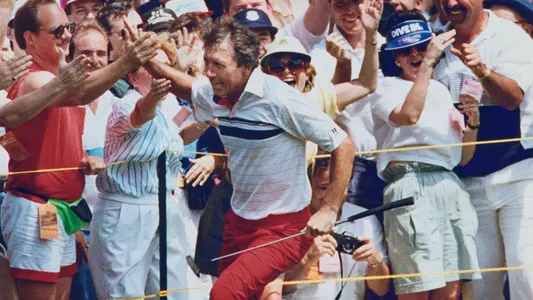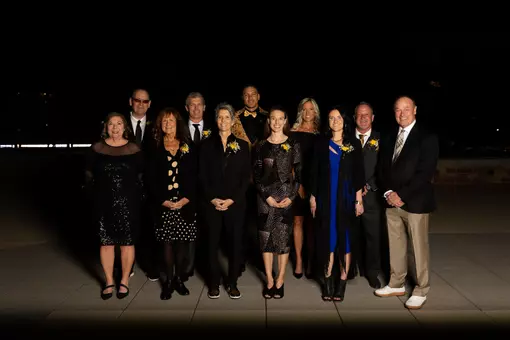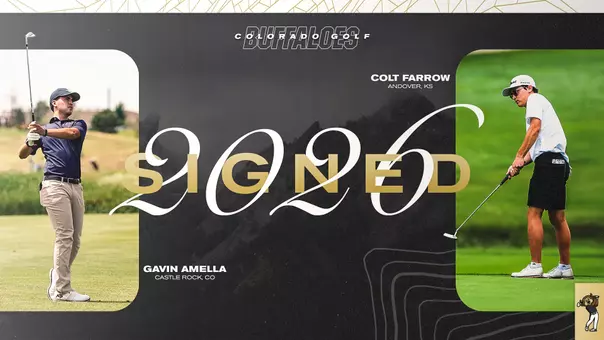Colorado University Athletics

30 Years Ago, Buffs Great Irwin Made History With Third U.S. Open Win
June 08, 2020 | Men's Golf, Alumni C Club, Neill Woelk
BOULDER — Thirty years later, it is still considered to be one of the iconic moments in golf history: Hale Irwin, seconds after sinking a 45-foot putt on the 18th hole of the final day of the 1990 U.S. Open at Medinah Country Club, racing along the gallery ropes, delivering high fives to a throng of appreciative fans.
It is etched in the memory of longtime golf followers, a moment of spontaneity that perhaps strayed from the normal staid decorum of the game, but one that deserved every bit of the exuberance displayed given the circumstances.
Three decades later, the former University of Colorado star golfer and football player still retains vivid memories of the moment.
"As important as that putt was, you can't stand back there at 45 feet and say, 'I'm gonna make this,'" he said recently with a chuckle. "You're an idiot if that's true. You might think you have a chance to make it, but you have to be surprised if you actually do. Even if you're the best putter in the entire world — 45 feet — there's just too many things that can go 'iffy.'"
But on that day, Irwin had been on a hot streak seldom seen in a major, particularly down the stretch. After starting the day four strokes behind the leaders, he had birdied the 11th, 12th, 13th and 14th holes to put himself in contention. But he needed one more birdie on the 18th to take the lead and put pressure on the groups playing behind him.
"I read the putt and when I stroked it, the first thing I remember is it's a solid hit. OK, good," he said. "I got it started initially on the line I wanted. There was a spot perhaps six or seven feet from the hole, just a little bit of a rise before it just slightly went down to the hole. I thought if I can get it over that spot, then I might have a chance. And it rolled right over that spot. So that's when it got exciting."
Irwin's read and execution proved to be perfect. When the ball dropped into the hole, the gallery erupted and Irwin simply reacted to the moment.
"When it went in, the roar of the crowd in that little stand where all the trees were was deafening," Irwin said. "My exuberance, if you wish, overcame perhaps my good manners but I just felt so uplifted by the noise. The reaction of the crowd — not only my own reaction but the crowd's reaction — and the high fiving just came as a thank you. I just felt the need to go over there and say, 'Thanks.'"
The shot did not win the tournament for Irwin. But it did make him the leader in the clubhouse, and he spent the next hour watching as the day's early leaders wrapped up their rounds.
One by one, they faltered. On the 18th hole, Mike Donald — the leader when the day began — missed a putt that would have clinched the title. Billy Ray Brown and Nick Faldo also stumbled down the stretch. When the day's play had finally finished, Donald and Irwin were tied for the lead, setting up an 18-hole playoff the next day.
"ABC had asked me to come up to their announcer's booth after my round so I spent the time up there trying to be polite and trying to show sportsmanship," Irwin said. "It was nerve wracking. I don't pull against people. That's not the nature of what we do. But it was interesting to see how it was all coming together for what looked like a Monday showdown. We still had Nick Faldo, Billy Ray Brown, and Mike Donald, and they all had a chance going into the last hole. Both Billy Ray and Nick missed putts on the last hole and Mike missed his that would have won it outright. They all had chances there at the last hole. For me, it wasn't anti-climactic, it's just that I couldn't do anything about it. I was just up there in the booth, hopefully going to have another day tomorrow."
When Donald missed his chance to win the tournament outright, it gave Irwin that extra day — but the extra round on Monday settled nothing as Irwin once again came up big down the stretch. He sank clutch birdie putts on the 16th and 18th holes to overcome a two-shot deficit with three holes to go, leaving the tournament tied after an extra 18 holes.
That set up the first sudden-death playoff in Open history. On the first hole — the 91st of the tournament for Irwin and Donald — Irwin delivered a clutch birdie putt and Donald missed an opportunity to do the same. That handed the former University of Colorado star golfer and football player his third U.S. Open title on June 18, 1990, and also made the 45-year-old Irwin the oldest U.S. Open winner in history.
"Everything at Medinah kind of ended in the last part of the round on Sunday," Irwin said. "On Monday it was pretty pedestrian for the first 50 to 80 percent of the round. But there was a lot of stuff happening in those last few holes both days. It really gave a great meaning and great dynamics to what was going on."
The victory at Medinah ended a five-year winless streak for Irwin, who had spent much of his time during that period engaged with his newfound love of designing golf courses. It was an endeavor he thoroughly enjoyed, but one that took away from his game.
"I had great fun doing it and putting together some great projects," he said. "But I was getting tired of playing like a middle of the road player."
So, prior to the 1990 season, he sat down and decided to address his golf game and see if he could regain the edge that had made him a top-flight player. He wrote a list of tournaments he had won to that point, then tried to remember what particular parts of his game made the difference in those victories.
"I thought back — what was it that week that got me to where I was?" Irwin said. "Was it alignment? Was it posture? Was it positive thinking? Was it good putting? Whatever it was, I tried to remember."
The end result was that Irwin rediscovered what had made him one of the best players in the world.
"I started thinking like a winning player again," he said. "That was the crucial thing for me. I knew it was still there because I could hit the golf shots. I hadn't lost that talent. What I had misplaced was the ability to take that and execute. The physical execution was there, but the mental execution was not. I wasn't taking that confidence. I wasn't taking that focus. I wasn't taking that plan of how to score. I was just hitting golf balls. I wasn't really playing the game. I truly enjoyed designing golf courses, but the heart and soul of Hale Irwin was being a competitive golfer. I had to go within myself. I had to go within my own head and within my own heart."
Irwin slowly regained his form early in 1990, but he still needed a special exemption to compete in the 1990 Open.
"I had been invited by the USGA to play because I didn't otherwise qualify," he said. "My goal was to make their at-large pick, if you wish, representative of the tournament. The U.S. Open kind of defined my career for many years and I just felt like I wanted to make their pick look good."
For the first three days of the tournament, he managed to stay close to the leaders. His play was nothing spectacular, but it was solid enough to keep him in the hunt.
"By the time we got to the Open I, I'd played some decent tournaments," he said. "Not great, but I'd played some decent tournaments and I could feel it coming together as the Open went along. On the final day, (co-leader) Billy Ray Brown came up to me and asked me for some advice. I have to thank Billy Ray to this day. I said, 'Well, you're obviously hitting the ball well. If it's a shot you're comfortable playing, hit it, but don't beat yourself. Don't be overly aggressive. Be comfortable but play your game.'"
Then, as Irwin walked to the first tee, a thought struck him.
"I think to myself, 'That was pretty good advice. Why don't you try it?' So that was the idea," he said.
Irwin was paired with Greg Norman on the final day of the Open.
"As I got to the 11th tee, Greg had just birdied 10," Irwin said. "I remember walking from 10 green to 11th tee thinking if he makes another birdie or two, he may have an outside shot. And I looked at the leaderboard and the top 15 and I was one stroke out of the top 15. So I set a goal for myself — I had to play one under in the last eight holes to be in the top 15. I just narrowed my focus and played the 11th hole great."
That's when Irwin realized he might be able to slip into the top 10. Then came another birdie on the 12th. "Then I'm thinking, 'OK, this is getting good. Shoot for top five."
Then another birdie. And another.
"I'm thinking, 'Now this is really interesting,'" he said. "I'm one stroke back of the then-lead. I thought, you know I'm getting greedy, but if I can make one more and post that score, then the leaders have to look at that score. Not saying they can't beat it or play as well or beat it, that's not the point. The point is they would have to look at it and I would be the leader of the clubhouse."
And the rest, as they say, is history. Irwin's score held as Donald couldn't get the win on the final hole of regulation, setting up the extra 18 holes on Monday and the decisive sudden-death 91st hole.
The victory left Irwin with a memory that still makes him chuckle.
"The real cherry on the whipped cream was after the festivities were over, everybody was trying to get out," Irwin said. "Everybody. The vendors, the TV people — everybody. So what was left for the three-time U.S. Open champion? Cold pizza. My wife and daughter had driven up for the week, so we hopped in my car and had cold pizza for the drive back to St. Louis. That's how you celebrate a three-time U.S. Open win — with a cold pizza."
And, there is one mystery from that year and that tournament Irwin is trying to solve.
That piece of yellow legal pad paper, the one on which he listed all the things that had made him a winner previously — the piece of paper that set the stage for a third U.S. Open championship — has disappeared. Irwin tucked into a desk and he has not been able to find it since.
"I'm going to tear that old desk of mine apart," Irwin said. "I think it's fallen down in a crack somewhere in that desk because I wouldn't have thrown it away. I'm going to find it because something that would be memorialized. That's a Hall of Fame thing."
Contact: Neill.Woelk@Colorado.edu





